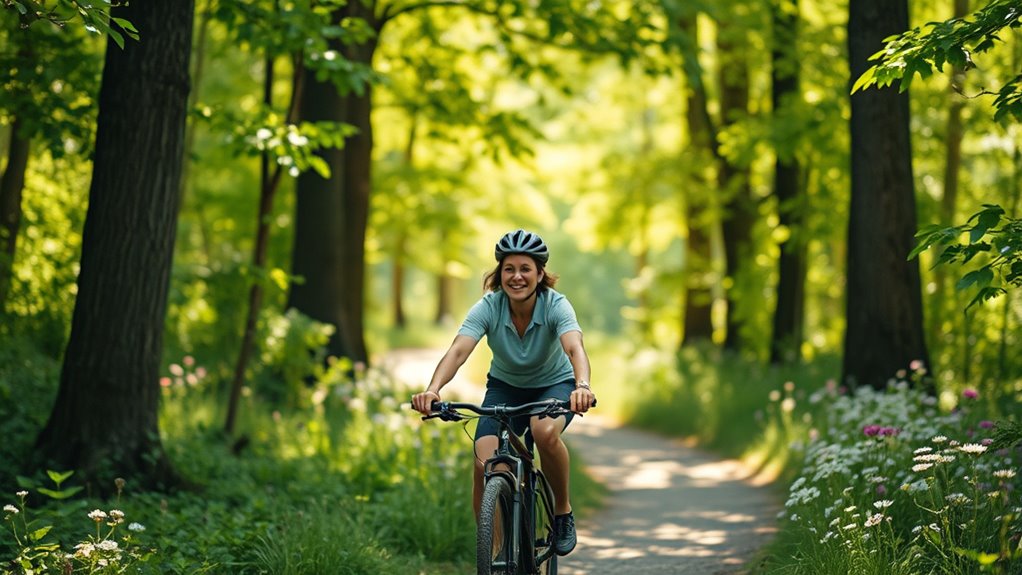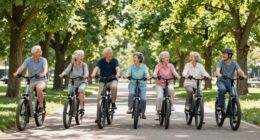Cycling in natural environments can profoundly boost your mental health by reducing stress, lifting your mood, and improving overall well-being. The calming sights, sounds, and smells of nature help lower cortisol levels and promote relaxation, while sunlight exposure boosts vitamin D and endorphin production. Outdoor cycling also enhances mental clarity and resilience, helping you feel more connected and mindful. Keep exploring how embracing nature on your rides can strengthen your emotional health and recovery journey.
Key Takeaways
- Cycling in natural environments reduces cortisol levels, alleviating stress and tension.
- Outdoor nature rides increase serotonin and endorphin production, improving mood and emotional well-being.
- Exposure to natural scenery enhances mental clarity, focus, and cognitive resilience.
- Group and community cycling foster social support, reducing loneliness and promoting emotional recovery.
- The sensory stimulation of nature promotes mindfulness, relaxation, and a mental reset within just 20 minutes.
How Cycling in Natural Settings Reduces Stress and Anxiety

Cycling in natural settings effectively reduces stress and anxiety by engaging your senses and calming your mind. As you pedal through scenic routes like riversides, forests, or mountain trails, your cortisol levels decrease, alleviating tension. The sights, sounds, and smells of nature stimulate your senses, helping you stay present and focused, which can combat negative thoughts. Even just 20 minutes outdoors can markedly improve your mental state, offering a quick mental reset. Natural environments provide variety, keeping your mind engaged and preventing boredom. This sensory engagement and exposure to calming surroundings promote relaxation, reduce feelings of anxiety, and support overall mental well-being. Incorporating nature-based activities into your routine can further enhance these benefits. Additionally, the therapeutic effects of spending time outdoors are supported by research showing improvements in mood and reductions in stress hormones. Regular exposure to natural environments can also foster resilience against daily stressors, contributing to long-term mental health improvements. Engaging with outdoor exercise not only boosts physical health but also amplifies the mental health benefits of being immersed in nature.
The Mood-Boosting Benefits of Outdoor Cycling

Spending time outdoors on a bike can considerably boost your mood by triggering positive neurochemical responses. When you cycle outside, your serotonin levels increase, helping regulate your mood. The natural environment also boosts endorphin production more than indoor exercise, enhancing feelings of happiness. Incorporating sustainable practices such as eco-friendly gear can further enhance the positive environmental impact of outdoor cycling. Sunlight exposure during cycling stimulates vitamin D synthesis, which is linked to fewer depressive symptoms. Additionally, being in nature lowers cortisol levels, reducing stress. Meta-analyses reveal that outdoor cycling effectively decreases anxiety, producing moderate to large effects. These neurochemical changes elevate positive affect and vigor, making you feel more energized and balanced. Increased physical activity has also been shown to contribute positively to overall mental health. Engaging in regular outdoor exercise, such as cycling, can lead to long-term mental health benefits, supporting sustained emotional resilience.
Enhancing Mental Clarity Through Nature and Movement

Being immersed in natural environments combined with physical movement considerably boosts your mental clarity and cognitive function. Exposure to nature enhances brain activity, improves attention, and promotes calmness, reducing feelings of isolation. Color accuracy impacts overall image quality, and similar precision in sensory perception can deepen your connection with natural surroundings. When you move through natural settings, your mind becomes more focused, and negative thoughts diminish, leading to better mood and emotional resilience. Even visual exposure to nature, like viewing images, can uplift your mental state. Additionally, engaging in nature-based activities can stimulate the production of endorphins, further enhancing mood and overall well-being. Regular outdoor activity also encourages the development of neuroplasticity, which is essential for maintaining cognitive health over time. Moreover, integrating mindfulness practices with outdoor activities can further amplify these positive effects, fostering a more profound sense of well-being. The synergy of cycling and being outdoors amplifies these benefits, strengthening executive functions and decision-making skills. This combination helps you reflect more clearly on personal issues while lowering stress levels. Engaging in outdoor exercise has been shown to reduce symptoms of anxiety and depression, further supporting mental health.
Cycling as a Supportive Tool in Mental Health Recovery

Engaging in outdoor cycling can serve as a powerful support in mental health recovery by actively reducing stress and anxiety. Cycling lowers perceived stress levels and boosts mood through endorphin release, helping you feel calmer and more balanced.
Commuting by bike adds enjoyment to daily routines, reducing routine-related stress. Improved blood circulation from cycling supports brain function, aiding in stress relief. Additionally, outdoor cycling offers natural stress reduction benefits that can enhance overall mental wellness.
Leisure rides in natural environments offer opportunities for relaxation, further easing anxiety. Studies show a 15% decrease in prescriptions for depression and anxiety among cycle commuters, highlighting cycling’s mental health benefits. Regular outdoor activity also encourages mindfulness by fostering present-moment awareness and reducing rumination.
Cycling outdoors combines physical activity with nature exposure, amplifying these effects. Furthermore, the store hours of local bike shops can influence access to cycling gear and repairs, supporting consistent cycling routines. Regular cycling fosters long-term anxiety reduction, making it an effective, accessible tool for mental health recovery. Additionally, choosing the right hot rollers can help maintain a fresh look after outdoor activities, encouraging continued engagement in outdoor pursuits.
A balanced diet rich in anti-inflammatory foods can also complement cycling’s benefits by supporting overall brain health and mood stability.
Building Self-Esteem and Confidence With Outdoor Rides

Outdoor cycling offers a powerful way to build self-esteem and confidence by providing tangible achievements and opportunities for personal growth. When you complete a challenging trail or improve your skills, you gain a sense of accomplishment that boosts your self-worth.
Setting goals, like finishing a route or mastering new techniques, reinforces your perceived competence. Short cycling sessions can quickly elevate your mood by releasing serotonin and endorphins, reducing stress and increasing confidence.
Steering through natural terrains and overcoming obstacles strengthen resilience and decision-making skills. Tracking your progress creates visible evidence of growth, fueling further motivation.
Exposure to nature during rides enhances mental clarity and reduces negative thoughts. As you push through weather challenges or mechanical issues, you develop self-reliance and mental toughness, fostering a lasting sense of self-esteem.
The Role of Community and Group Cycling in Mental Well-being

Community and group cycling play an essential role in enhancing mental well-being by fostering social connections and support. When you join group rides or cycling events, you create a sense of belonging that helps combat loneliness. These activities encourage meaningful interactions and strengthen community ties, especially through bike-to-work campaigns or local cycling clubs.
The shared experiences boost your mood, reduce stress, and increase motivation, making you feel safer and supported. Participating regularly offers a sense of achievement, which can improve self-esteem. Engaging in self-sufficiency activities like cycling can also foster a sense of independence and resilience, further benefiting mental health. Additionally, the sense of community created through group activities can help develop social skills, which are vital for overall mental wellness. Studies also suggest that being part of a supportive community can significantly enhance emotional health and provide a buffer against mental health challenges.
Building on this, research supports the use of 16PF personality assessment to understand individual differences in social engagement, which can help tailor community activities to maximize mental health benefits. Incorporating emotional regulation strategies in group settings can further enhance the positive effects of cycling communities. Group cycling also provides a healthy outlet for managing stress, allowing you to process emotions with others. Overall, these social interactions not only promote physical activity but also help you feel more connected, supported, and mentally resilient.
The Psychological Impact of Nature’s Calmness During Cycling

Cycling through natural environments has a profound psychological impact by promoting a state of calmness that can considerably reduce stress and anxiety. As you pedal amid greenery or water, your body lowers cortisol levels, easing tension.
The rhythmic motion of cycling acts like a meditative practice, calming your mind and reducing intrusive thoughts. Natural scenery activates your parasympathetic nervous system, helping you counteract fight-or-flight responses.
Exposure to sunlight during outdoor rides boosts serotonin, stabilizing mood. You’ll notice increased feelings of vigor, joy, and emotional resilience, thanks to sensory engagement like birdsong and rustling leaves.
These calming effects improve focus, sharpen problem-solving, and foster present-moment awareness. Over time, this natural tranquility helps build emotional stability and resilience, supporting your mental well-being.
Combining Physical Exercise and Nature for Holistic Wellness

Engaging in physical exercise amid natural surroundings amplifies the mental health benefits you experience during outdoor activities. Cycling in nature releases endorphins, boosting your mood and overall well-being. It also helps reduce stress hormones, leaving you feeling calmer and more relaxed.
When you cycle outdoors, you engage socially, strengthening community bonds and providing emotional support. Exposure to natural environments enhances mental clarity and fosters a deeper connection with your surroundings.
Combining physical activity with nature promotes holistic wellness by improving emotional health, reducing anxiety and depression symptoms, and increasing self-esteem through a sense of achievement. The sensory richness of natural settings further sharpens your focus, creativity, and mental resilience, making outdoor cycling a powerful approach to nurturing both your body and mind.
Nature-Based Cycling: An Alternative Approach to Therapy

Nature-based cycling offers a compelling alternative to traditional therapy by harnessing the healing power of natural environments. When you cycle outdoors, you reduce anxiety and stress by shifting focus away from daily worries, promoting relaxation.
The natural surroundings boost your mood through endorphin release, leaving you feeling happier and more balanced. It also encourages mindfulness, helping you stay present and lessen concerns about the past or future.
The physical activity combined with nature’s calming influence sharpens mental clarity, supporting better decision-making. Regular exposure to natural landscapes can lower cortisol levels, reduce depression symptoms, and foster a sense of connection—to the environment and yourself.
Promoting Social Connections and Community Engagement Through Cycling

Participating in group rides and community events creates opportunities for meaningful social connections that enhance mental well-being. By joining rides accessible to all skill levels, you foster a sense of belonging and community engagement.
Joining inclusive group rides fosters community, enhances mental well-being, and builds meaningful social connections.
Cycling groups offer face-to-face interactions that help reduce digital isolation, while initiatives like women-only rides ensure everyone feels included and safe. Social media groups and messaging forums serve as hubs for organizing activities and sharing support.
Shared passions for cycling build friendships, and post-ride gatherings like coffee chats strengthen bonds beyond cycling. These interactions cultivate trust and camaraderie, providing emotional support that boosts mental health.
Community events and collaborations with local organizations further promote inclusivity, making cycling a powerful tool for social connection and community building.
Frequently Asked Questions
Can Cycling in Nature Help Manage Specific Mental Health Conditions?
You might wonder if cycling outdoors can help with mental health issues. The answer is yes; riding in natural settings reduces anxiety, depression, and stress. It boosts mood by increasing serotonin and endorphins.
It also improves focus for conditions like ADHD and helps manage trauma symptoms. The combination of physical activity and nature exposure supports emotional regulation, mindfulness, and social connection.
This makes cycling a valuable, accessible tool for managing various mental health challenges.
How Often Should One Cycle Outdoors for Mental Health Benefits?
You might find that weaving cycling into your routine a few times a week works wonders for your mood. Aim for about three to five sessions, each lasting around 45 minutes, to enjoy consistent mental benefits.
Even shorter rides can help you unwind and refresh. The key is to stay regular, making outdoor cycling a pleasant part of your life, connecting you with nature and boosting your overall well-being.
Are There Age Restrictions for Using Cycling as Therapy?
You might wonder if there are age restrictions when using cycling as therapy. Generally, there aren’t specific laws limiting age, since regulations focus on medical consent rather than activity participation.
Kids usually need parental permission, while older adults benefit from adapted programs. Safety and individual health are key, so assessments guarantee everyone can ride safely.
Adaptive equipment and community initiatives make cycling accessible across all ages, promoting mental and physical well-being.
What Types of Natural Environments Are Most Beneficial for Mental Health?
Did you know that spending time in green and blue spaces can boost your mental health considerably? Forests, with their phytoncides, reduce stress, while coastal areas lower rumination.
Urban parks and riverfronts also improve mood and relaxation. You’ll find that diverse environments like mountains and wetlands offer unique benefits, such as awe and emotional regulation.
Incorporating these natural settings into your routine can enhance your overall well-being and resilience.
Can Beginners Experience Mental Health Improvements From Outdoor Cycling?
Yes, as a beginner, you can definitely experience mental health benefits from outdoor cycling. It’s a low-impact activity that boosts endorphin levels, helping reduce anxiety and depression.
Pedaling rhythmically can create a meditative state, while exposure to sunlight lifts your mood. Plus, riding outdoors allows you to disconnect from digital stressors, explore nature, and build confidence with small achievements—all contributing to improved mental well-being.
Conclusion
Embrace the healing power of nature cycling, where each pedal stroke paints a vibrant stroke on the canvas of your mind. As you weave through lush landscapes, you’ll find stress melting away like snow under spring sun, and your mood lifting higher than the tallest tree. Cycling outdoors isn’t just exercise; it’s a journey into serenity and self-discovery, transforming your mental health one peaceful ride at a time. Let nature’s calm be your guiding light.









